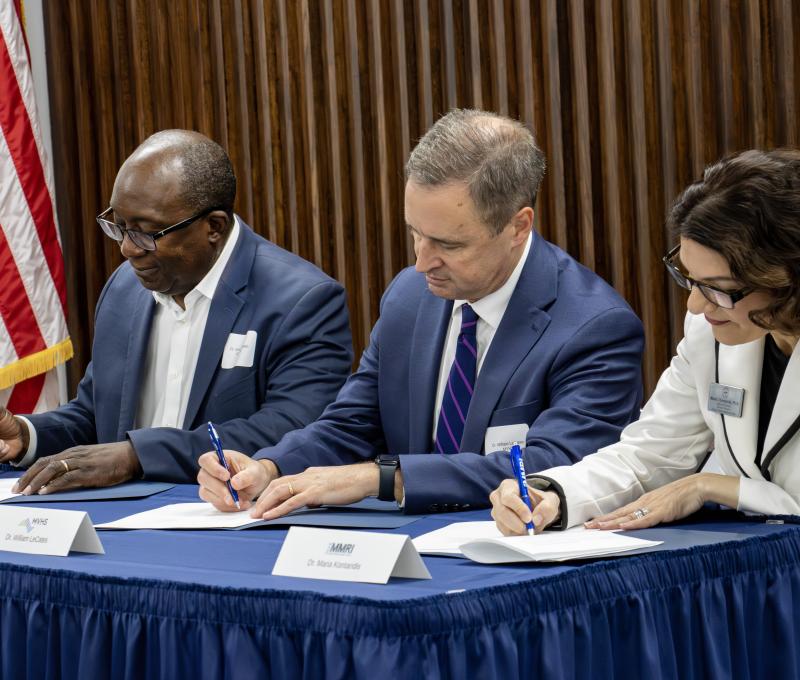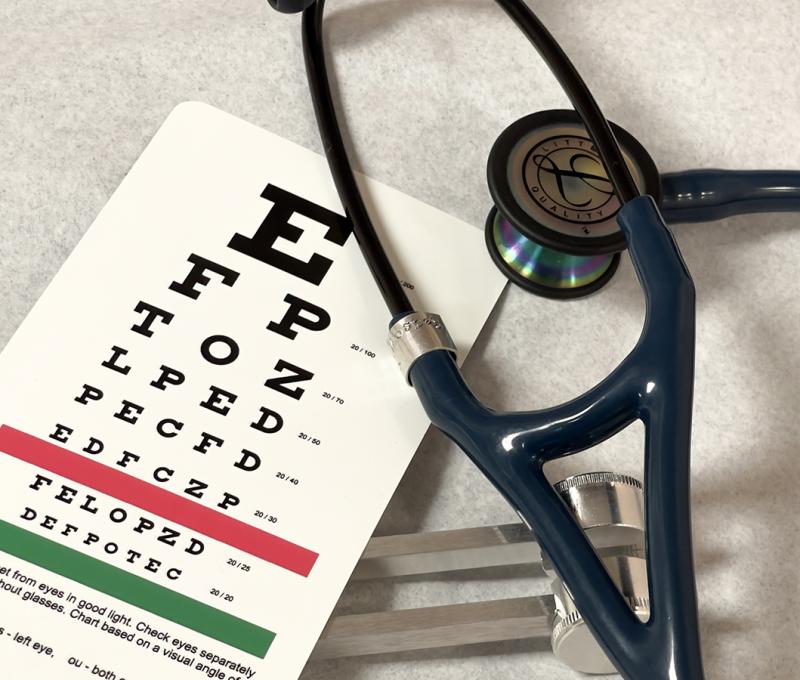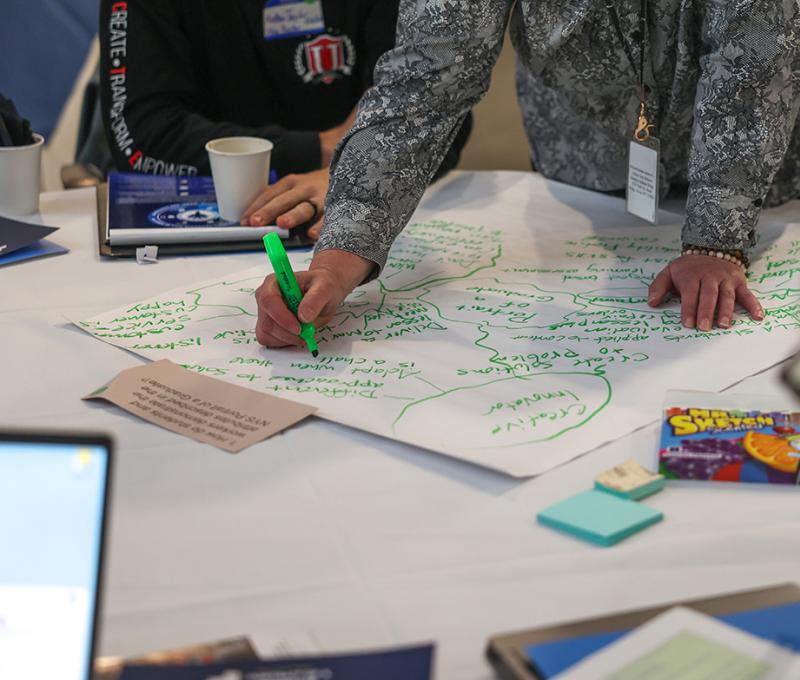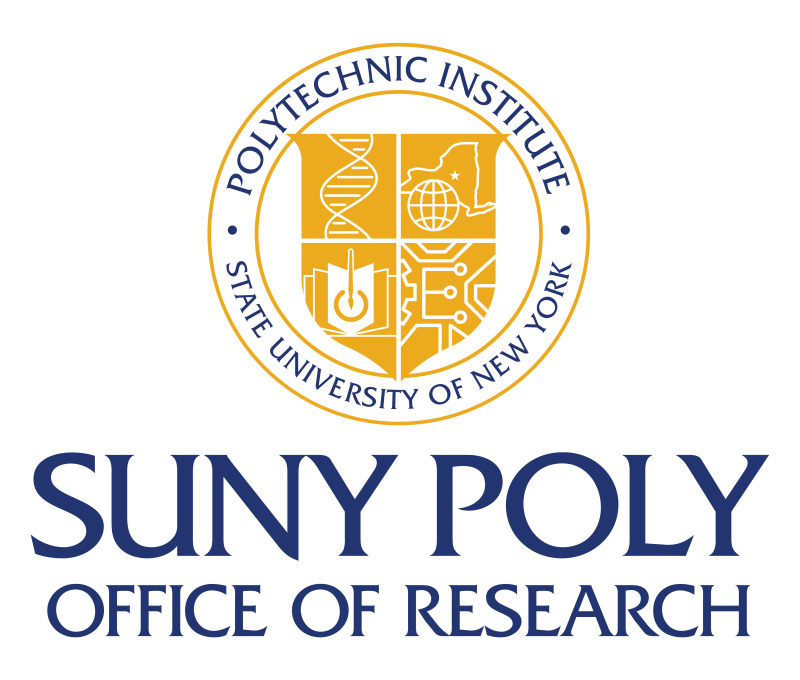SUNY Poly Awarded $1.2 Million by Air Force Research Lab to Launch New

For Release: Immediate – January 20, 2016
Contact: Jerry Gretzinger, Vice President of Strategic Communications and Public Relations
(518) 956-7359 | jgretzinger@sunypoly.edu
R&D Project Enabling Next-Generation Computer Systems
Research will leverage leading-edge ‘neuromorphic’ technologies that mimic the human brain to overcome current computer system performance limitations
Albany, NY – Highlighting the continued success of Governor Andrew M. Cuomo’s innovation model that has laid the groundwork for unprecedented high-tech research and development opportunities across New York State, SUNY Polytechnic Institute (SUNY Poly) today announced that Associate Professor of Nanobioscience Dr. Nathaniel Cady has been awarded $1.2 million from the Air Force Research Lab (AFRL). The award is part of a $2.4 million grant in collaboration with the University of Tennessee, Knoxville (UTK) enabling the fabrication and testing of a dynamic, adaptive neural network array based on memristors, cutting-edge technology which could one day lead to faster, more energy efficient and powerful computer capabilities.
“The Air Force Research Lab grant underscores the fact that Governor Cuomo’s strategy catalyzing a high-tech research and development ecosystem in New York State, pioneered by SUNY Poly, is driving development of technologies which have the potential to revolutionize computing in the years ahead,” said Dr. Michael Liehr, SUNY Poly Executive Vice President of Innovation and Technology and Vice President of Research. “We are delighted that the Air Force Research Lab has recognized this cutting-edge work, and we are excited to collaborate with our partners at the University of Tennessee, Knoxville to bring these advanced computing concepts from the lab to the fab.”
The three-year AFRL award enables the development of a memristor-based dynamic adaptive neural network array (mrDANNA). As part of the collaboration, the mrDANNA will be designed at UTK while SUNY Poly’s world-class Albany NanoTech Complex will be leveraged to create chip prototypes that can be tested and refined to address contemporary application challenges and enable continued computer chip performance scaling, especially as Moore’s Law, which predicts regular increases in transistor-based computing power, is expected to approach physical limitations.
As the acronym indicates, the mrDANNA research will be based on memristors, technology that can take the 1’s and 0’s of transistor-based computing to the next level by utilizing more than the binary on/off states that are used in today’s computers. Memristors are able to change their resistance values incrementally; the greater the number of resistance levels, the more bits of information can be stored by each memristor. Placing them in an adaptable “neuromorphic” array opens the door to computers that would more closely resemble neurons and synapses—the complex hardware of the human brain. As part of this new effort, the team of SUNY Poly researchers plans to optimize memristor electrical characteristics to achieve peak performance of the neuromorphic array so that it offers the best real-time dynamic adaptability, configurability, and scalability. In addition, with memristors able to be packed tightly together, they offer greater device density, which, in turn, enables increased energy efficiency as well.
“This grant from the Air Force Research Lab aligns well with Governor Andrew Cuomo’s strategy for spurring high-tech innovation in New York State, and we are thrilled to be able to investigate these novel technologies that can usher in a new era of more sophisticated and powerful computing,” said Dr. Cady. “We are grateful to the AFRL for recognizing this trailblazing work, and we look forward to collaborating with the research team at UTK to substantially improve computer memory. Another key benefit is that SUNY Poly students will observe and be a part of this research, providing a truly one-of-a-kind educational opportunity.”
Because the mrDANNA technology could tackle the increasing number of problems that require techniques and systems which can better capture knowledge from an abundance of data, a successful neuromorphic architecture could be used for applications ranging from autonomous control of robotic systems and real-time anomaly detection in network traffic, to video and audio classification, essentially offering more advanced ways to evaluate, contextualize, and make data and the systems it supports more useful. This research could also have larger ramifications for computing in general. For example, because memristors hold their memory state when power is turned off, the array could be a major step toward creating computers that instantly turn on, rendering computer crashes a distant memory because they would never lose data.
“With this grant from the Air Force Research Lab and working with the globally recognized SUNY Polytechnic Institute to drive innovation in this growing field, we are excited to play a role in designing the mrDANNA framework which could offer game-changing capabilities to the more advanced computers we may all use one day,” said Dr. Garrett Rose, University of Tennessee, Knoxville Associate Professor. “With research teams from both institutions collaborating, we will be able to develop and test these original designs, setting the stage for an exciting future of greatly expanded computing power and capability.”
Leveraging Dr. Cady’s already existing memristor/resistive random-access memory (ReRAM) research effort at SUNY Poly, the AFRL grant will also provide a number of graduate and undergraduate students at SUNY Poly with a unique, hands-on educational experience as they research, develop, and create mrDANNA prototypes inside SUNY Poly’s ultramodern laboratories and cleanroom facilities.
####################
SUNY Polytechnic Institute. SUNY Polytechnic Institute (SUNY Poly) is New York’s globally recognized, high-tech educational ecosystem, formed from the merger of the SUNY College of Nanoscale Science and Engineering and SUNY Institute of Technology. SUNY Poly offers undergraduate and graduate degrees in the emerging disciplines of nanoscience and nanoengineering, as well as cutting-edge nanobioscience and nanoeconomics programs at its Albany location and undergraduate and graduate degrees in technology, including engineering, cybersecurity, computer science, and the engineering technologies; professional studies, including business, communication, and nursing; and arts and sciences, including natural sciences, mathematics, humanities, and social sciences at its Utica/Rome location. Thriving athletic, recreational, and cultural programs, events, and activities complement the campus experience. As the world’s most advanced, university-driven research enterprise, SUNY Poly boasts more than $43 billion in high-tech investments, over 300 corporate partners, and maintains a statewide footprint. The 1.3 million-square-foot Albany NanoTech megaplex is home to more than 4,000 scientists, researchers, engineers, students, faculty, and staff, in addition to Tech Valley High School. SUNY Poly operates the Smart Cities Technology Innovation Center (SCiTI) at Kiernan Plaza in Albany, the Solar Energy Development Center in Halfmoon, the Children’s Museum of Science and Technology (CMOST) in Troy, the Central New York Hub for Emerging Nano Industries in Syracuse, the Smart System Technology and Commercialization Center (STC) in Canandaigua, and the Photovoltaic Manufacturing and Technology Development Facility in Rochester where SUNY Poly also leads the American Institute for Manufacturing Integrated Photonics. SUNY Poly founded and manages the Computer Chip Commercialization Center (Quad-C) at its Utica location and also manages the $500 million New York Power Electronics Manufacturing Consortium, with nodes in Albany and Rochester, as well as the Buffalo High-Tech Manufacturing Innovation Hub at RiverBend, Buffalo Information Technologies Innovation and Commercialization Hub, and Buffalo Medical Innovation and Commercialization Hub. For information visit www.sunycnse.com and www.sunypoly.edu.








